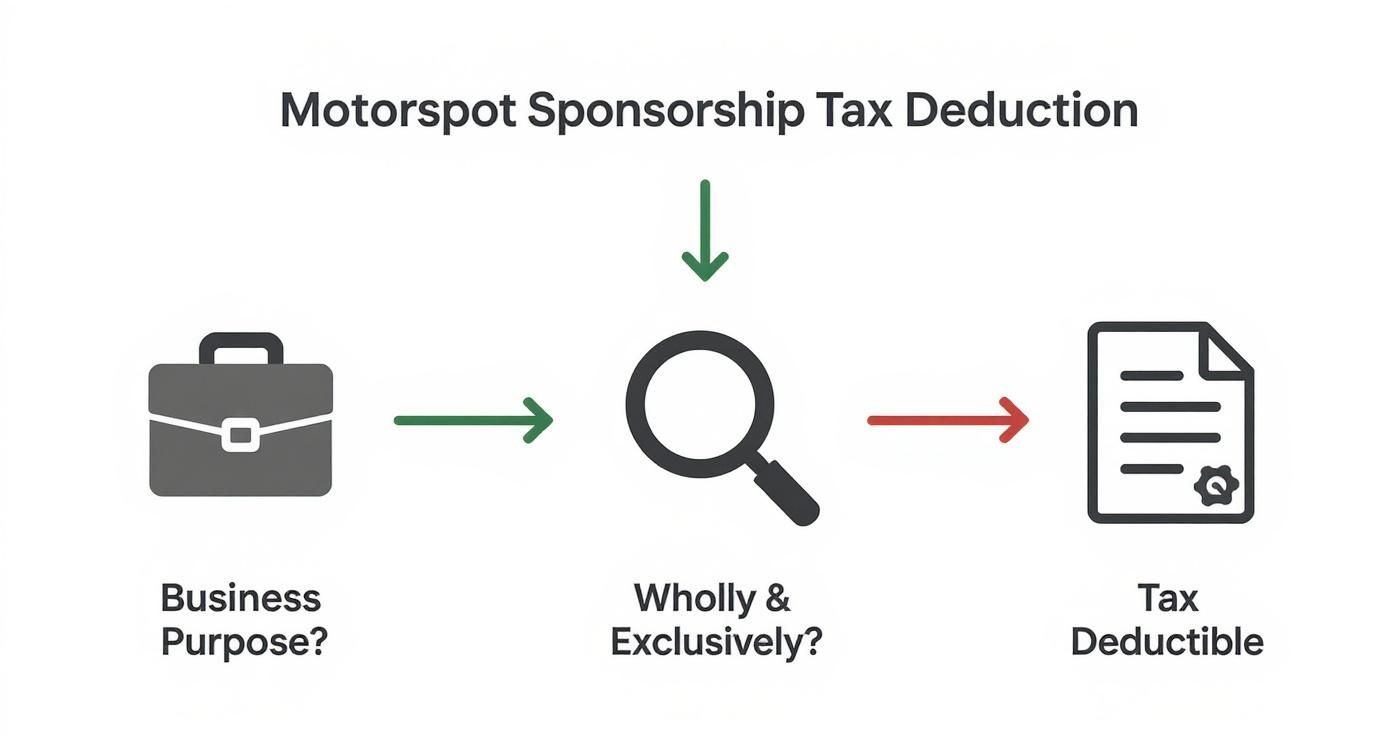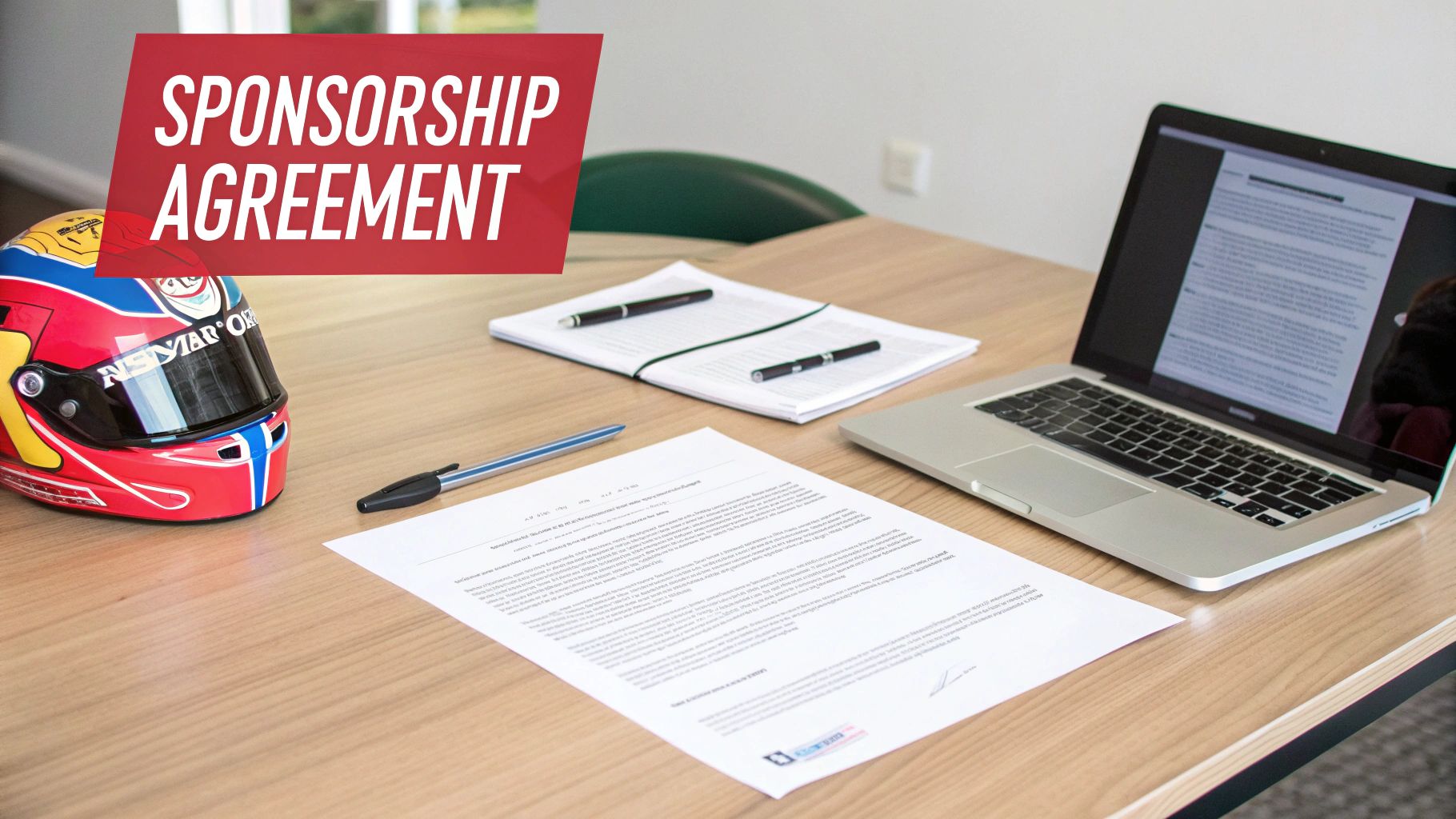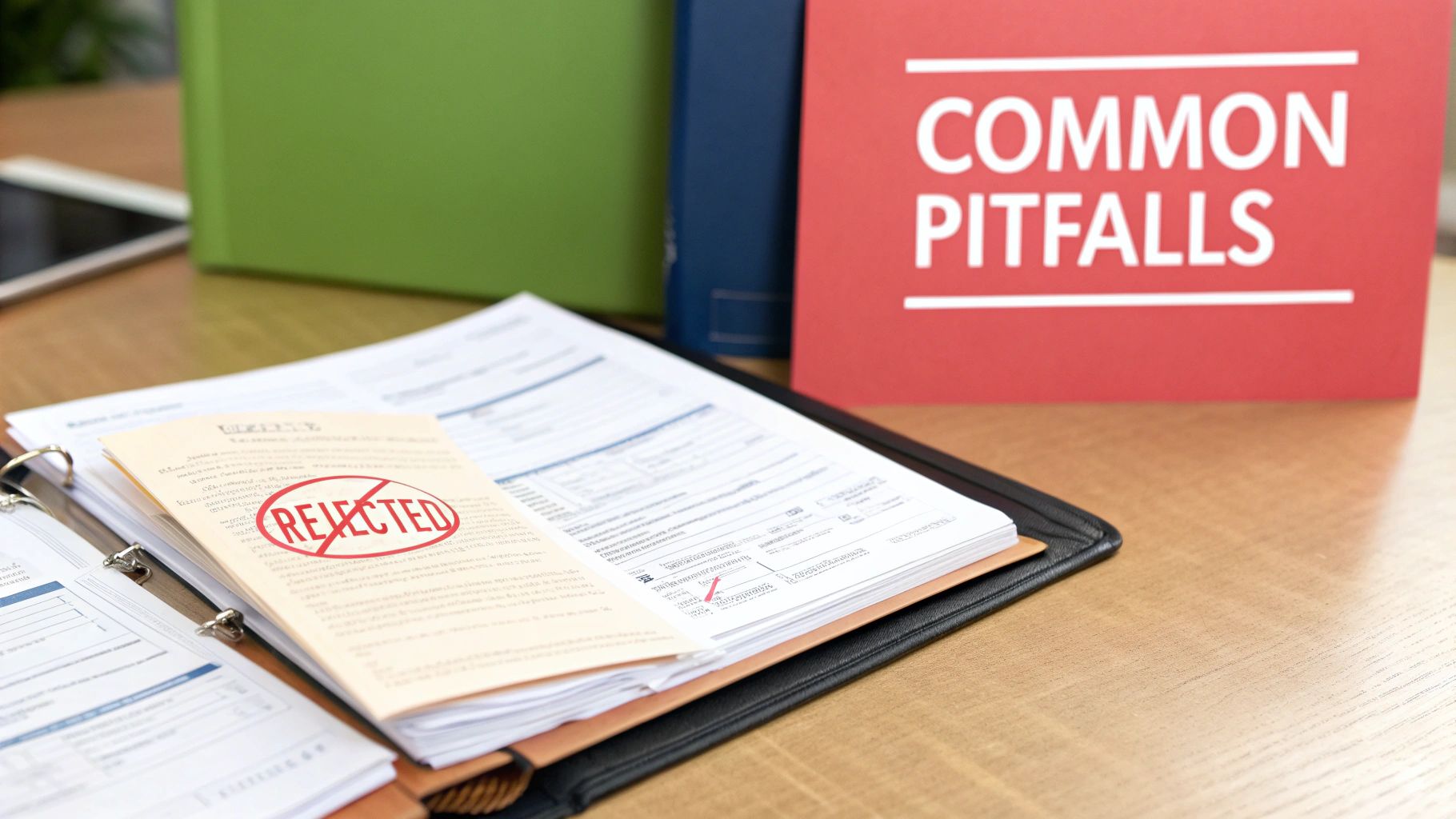Motorsport Sponsorship Tax Deductible UK Guide
Yes, you absolutely can claim motorsport sponsorship as a fully tax-deductible business expense in the UK. But here's the catch: it’s not automatic. The entire claim hangs on one crucial point – treating the sponsorship as a legitimate marketing investment, not just a passion project you’re funding on the side.
Your Guide to Motorsport Sponsorship Tax Deductions
Sponsoring a race car or driver is a seriously powerful marketing tool, but so many businesses get tripped up wondering if the expense will actually get approved for tax relief. The key is a simple shift in mindset: stop thinking like an enthusiastic supporter and start acting like a strategic advertiser.
For HMRC to sign off on a deduction, the money you put in must be part of a calculated plan to promote your business, pull in new leads and get your brand seen.
Think of it this way: paying to get your logo on a race car is no different from buying a billboard on the M1 or running a Google Ads campaign. The end goal is exactly the same – to generate a commercial return on your investment. This guide will walk you through setting everything up correctly from the start, so there are no nasty surprises later on.
The Cornerstone of a Successful Claim
The whole framework for claiming tax relief on motorsport sponsorship rests on a single principle from HMRC. It’s known as the ‘wholly and exclusively’ test . This simply means you have to be able to prove that every single pound was spent for the purpose of your business and for that purpose alone.
Any hint of a ‘dual purpose’ – like sponsoring a family member out of personal pride without a proper commercial agreement in place – could torpedo your entire claim. The motive has to be 100% business-driven.
To clear this hurdle, your sponsorship needs to deliver real, tangible benefits to your company. Things like:
- Brand Exposure: Your company logo and branding splashed across the car, the driver’s suit and team gear.
- Marketing Content: The right to use photos and videos of the car and driver in your company's own advertising.
- Corporate Hospitality: Opportunities to bring clients and key partners to race events for a memorable experience.
- Digital Promotion: Getting shout-outs and features on the driver or team’s social media channels.
A landmark legal case, The Crown and Cushion Hotel v HMRC [2016] , really set the precedent here. The tribunal decided that a hotel's £160,000 annual sponsorship of a director’s daughter in motorsport was a legitimate business expense. Why? Because it was backed by a formal agreement and provided promotional value that stacked up against their previous advertising efforts. This case proves that even family connections don't automatically kill a claim, as long as the business benefit is genuine and you can prove it. It's well worth exploring a detailed summary of this important tax tribunal case to get your head around the details.
Of course, the structure of your business—whether you're a sole trader or a limited company—also affects how these expenses are handled. For a clearer picture on business structures, check out our guide on the difference between a company and an LLP.
Meeting HMRC's Wholly and Exclusively Test
When you want to treat motorsport sponsorship as a tax-deductible expense, there’s one golden rule you need to live by: HMRC’s ‘wholly and exclusively’ test . This isn’t just jargon; it’s the bedrock of all business expense claims in the UK.
Get this right and you’re on solid ground. Get it wrong and your entire claim could be thrown out.
Think of it in two simple parts. ‘Wholly’ means every single penny of the sponsorship money must be spent for your business's purposes. ‘Exclusively’ means there’s no ulterior motive, no hidden personal benefit driving the spend.
Your sponsorship needs to be a cold, calculated commercial decision. It's not a passion project or a favour for a friend. The goal must be to generate a real, tangible return for your business, just like any other marketing spend you'd sign off on.
Differentiating Business from Personal Motives
HMRC inspectors have a sixth sense for spotting expenses that serve a dual purpose. A classic red flag is sponsoring a close family member’s racing career. While it’s perfectly legal, it will be put under a microscope. If the real reason you’re sponsoring them is family pride rather than a clear commercial strategy, HMRC will likely disallow the expense.
To stay on the right side of the line, your sponsorship deal has to deliver genuine business benefits. What does that look like in practice?
- Brand Awareness: Your company logo splashed across the race car, the driver’s suit and the team transporter.
- Client Engagement: Using race weekends as a backdrop for corporate hospitality, letting you build stronger relationships with key clients.
- Digital Marketing: A contractual obligation for the driver or team to promote your brand across their social media channels.
- Content Generation: Securing the rights to use high-octane images and videos from the track in your own marketing campaigns.
At the end of the day, you're not just giving money away. You are purchasing a marketing and advertising service.
Proportionality Is Key
Another crucial piece of the puzzle is proportionality . The amount you spend has to make sense for a business of your size and turnover. For example, spending £50,000 on a sponsorship deal when your annual profit is only £60,000 is going to raise immediate alarm bells at HMRC. It just doesn't look like a sensible commercial decision.
The expenditure must fit within your overall marketing budget and have a justifiable, expected return. You have to be able to stand up and argue that this was a legitimate move to grow your business, not just a creative way to get trackside perks.
This infographic breaks it down into a simple decision tree, helping you see if your sponsorship ticks the right boxes.

As the visual guide shows, a successful claim always starts with a clear business purpose and sticks rigidly to that ‘wholly and exclusively’ rule, steering well clear of any personal crossover.
Tax deductions for motorsport sponsorship aren't a given; the onus is on you to prove the spend is directly tied to your trade. There’s no magic number or fixed cap. Instead, you need to build a case with contracts, data and measurable results. With that in mind, knowing the fundamentals of preparing for a tax audit is invaluable for substantiating your claims with confidence.
The core takeaway is this: you must be able to prove to an impartial observer that the sponsorship was undertaken to promote and benefit your business, with any personal enjoyment being an incidental, not intentional, outcome.
By structuring your sponsorship with a clear commercial focus, keeping the spend proportional and documenting absolutely everything, you build a rock-solid case that meets HMRC’s criteria. This ensures your investment not only boosts your brand but also delivers its full value as a legitimate, tax-deductible business expense.
Structuring a Compliant Sponsorship Agreement
When it comes to making your motorsport sponsorship tax deductible, a handshake agreement is completely worthless. For HMRC, if it’s not written down, it didn’t happen. A formal, legally sound sponsorship agreement is your single most important piece of evidence to prove you’ve made a commercial investment.
This document is far more than a formality; it’s the bedrock of your entire claim. It turns what could be seen as a vague payment into a clear, contractual purchase of marketing services. Without this paper trail, your claim is wide open to being dismissed as a personal gift or a dual-purpose expense—either of which will kill any chance of tax relief.
A properly structured agreement defines the relationship in black and white. It lays out the exact obligations, deliverables and payment terms, leaving zero room for interpretation. This level of clarity not only keeps HMRC happy but also protects both your business and the driver or team you're backing.

What Are You Actually Buying?
The heart of your agreement must be a detailed breakdown of the promotional services your business gets for its money. Vague terms like “sponsorship” just won’t cut it. You need to itemise the specific marketing activities that will be carried out.
Think of it like hiring any other marketing agency. You’d expect a clear scope of work and the exact same principle applies here. Your contract needs to spell out the tangible benefits your business is purchasing.
This is how you draw a direct line from your financial spend to your business's marketing strategy. These defined services are what transform your payment into a legitimate, tax-deductible expense.
Your contract should nail down specifics like:
- Logo and Brand Placement: Specify the exact locations, sizes and prominence of your company logo—on the race car, driver’s suit, team apparel, pit garage and transporter.
- Social Media Duties: Detail the required number of posts, mentions and tags per month across platforms like Instagram, X and Facebook. Define the type of content, whether it's race updates, behind-the-scenes shots or product shout-outs.
- Event Appearances: Outline any requirements for the driver or team to show up at corporate events, trade shows or client hospitality days. Be clear on how long they need to be there and what they’ll be doing.
- Content Rights: Secure the right to use photos and videos of the car and driver in your own marketing. This includes your website, social media feeds and any ads you run.
A strong contract is your shield during an HMRC enquiry. It proves you entered into a commercial deal with clear expectations of a return, completely separate from any personal passion for the sport.
To make things crystal clear, your agreement should contain several essential clauses that demonstrate its commercial purpose.
Essential Elements of a Compliant Sponsorship Agreement
| Clause/Element | Purpose and Description | Example Wording (Concept) |
|---|---|---|
| Parties Involved | Clearly identifies the sponsoring business and the sponsored driver/team. | "This Agreement is made between [Your Company Ltd] (the Sponsor) and [Driver/Team Name] (the Recipient)." |
| Term of Agreement | Defines the start and end dates of the sponsorship, usually aligned with the race season. | "This Agreement shall commence on [Start Date] and continue until [End Date], covering the [Year] race season." |
| Sponsorship Fee | Details the total amount payable and the payment schedule. | "The Sponsor agrees to pay a total Sponsorship Fee of £10,000 + VAT , payable in four equal instalments of £2,500 + VAT on..." |
| Sponsor's Obligations | Outlines the specific marketing deliverables the driver/team must provide (branding, social media, etc.). | "The Recipient shall provide the following services: placement of the Sponsor's logo (specifications attached), four (4) dedicated social media posts per month..." |
| Intellectual Property | Grants the sponsor the right to use the team's name, images and likeness for marketing. | "The Recipient grants the Sponsor a non-exclusive, royalty-free licence to use their name, image and likeness for promotional purposes..." |
| Termination Clause | Sets out the conditions under which either party can end the agreement. | "Either party may terminate this Agreement with 30 days ' written notice if the other party is in material breach of its obligations." |
| Exclusivity | States whether the sponsor has exclusivity within their industry sector. | "The Recipient agrees not to enter into sponsorship agreements with any other company operating in the [Sponsor's Industry] sector for the term of this Agreement." |
This table isn't exhaustive, but it covers the core components HMRC will look for to see a genuine commercial arrangement.
Payment Schedules and Proving It Worked
Your agreement must also set out a clear payment schedule. Don't just send a single lump sum without any context. Instead, structure payments to align with the racing season or specific milestones, like quarterly instalments or payments tied to major race events. This reinforces the ongoing nature of the business relationship.
Even better, try to include a few Key Performance Indicators (KPIs) to prove you’re serious about the commercial side of things. While not strictly mandatory, KPIs show HMRC you're actively measuring the return on your investment.
These metrics could include:
- Tracking increases in social media followers or engagement rates.
- Watching website traffic for spikes during race weekends.
- Logging the number of new leads or sales enquiries that mention the sponsorship.
Even if you're just starting out, building a framework to measure impact is a vital step. If this is new territory, our guide on crafting a winning motorsport sponsorship proposal offers some great insights into setting realistic goals from day one.
Finally, proper invoicing is non-negotiable. Every single invoice from the driver or team must explicitly state it is for " Sponsorship and Marketing Services " and reference the formal agreement. This creates an undeniable paper trail that backs up your contract, giving you the clear, consistent evidence needed to satisfy any official checks and secure your tax deduction.
Common Mistakes That Invalidate Your Claim
Navigating the rules around tax-deductible motorsport sponsorship can feel a bit like threading a needle on a high-speed corner. Get it right and you unlock significant savings. Get it wrong and your claim could be swiftly rejected by HMRC, leading to financial penalties and unwanted scrutiny.
Knowing what not to do is just as critical as following the correct procedures. Many well-intentioned businesses fall foul of easily avoidable errors, often stemming from a misunderstanding of that golden rule we’ve covered: the expense must be wholly and exclusively for business purposes . A simple oversight is all it takes to turn a smart marketing investment into a costly mistake.
To keep your sponsorship claim on the right side of the tax regulations, it’s vital to steer clear of the most frequent pitfalls. Think of this as your checklist for avoiding common business tax mistakes that could get your deduction thrown out.

The Dual-Purpose Trap and Family Connections
The most common red flag for HMRC is the ‘dual-purpose’ expense . This is where a sponsorship has a clear personal benefit alongside the business one. Sponsoring your son, daughter or another close relative is the classic example that will immediately attract extra scrutiny.
It’s not impossible to claim tax relief when sponsoring a family member, but the burden of proof is exceptionally high. You have to demonstrate, convincingly, that the decision was a cold, hard commercial one—not something driven by parental pride or family ties. Without a watertight contract and measurable business outcomes, the claim will almost certainly fail.
Cautionary Tale: A local construction director sponsored his son’s karting career for £15,000 . He had no formal contract and couldn't show any new business came from the small logo on the kart. HMRC disallowed the entire claim, ruling it was parental support, not a genuine business expense.
Poor Record-Keeping and Vague Agreements
A quick chat and a casual email just won’t cut it. Without a formal sponsorship contract and meticulous records, you have absolutely no way to prove the commercial nature of the deal. HMRC needs to see a clear, professional paper trail.
This is an incredibly easy mistake to avoid, yet it trips businesses up all the time. A lack of proper documentation immediately suggests a lack of commercial intent, leaving your claim wide open to challenge.
Key documentation failures to steer clear of include:
- No Formal Contract: Failing to get a signed agreement that details the specific marketing services being provided.
- Improper Invoicing: Accepting invoices that just say "Sponsorship" instead of something specific like "Marketing and Promotional Services".
- Lack of Evidence: Forgetting to collect proof of the sponsorship in action—photos of your branding at the track, screenshots of social media posts and so on.
Disproportionate Spending and Labelling It a 'Gift'
Another critical error is spending an amount on sponsorship that’s completely out of sync with your business’s size. If a small company with a £100,000 turnover suddenly spends £50,000 on a race team, HMRC is going to question the commercial sense of that decision. The spend must look and feel like a reasonable business move.
Finally, never refer to the payment as a "donation" or "gift" in any of your records or communications. This language instantly kills the commercial basis of the transaction. A donation is given with no expectation of return, which makes it non-tax-deductible. Sponsorship, on the other hand, is a payment for services rendered. The words you use matter.
Tax Implications for the Sponsored Driver or Team
While the sponsoring business is sorting out their tax deduction, the story doesn't end there. For the driver or team on the receiving end, that sponsorship money isn't just a tax-free helping hand.
HMRC sees these payments as taxable income . This is a crucial detail for any racer to get their head around. You aren't just getting support; you're being paid to deliver a marketing service.
This income needs to be declared, whether you're set up as a sole trader, a partnership or a limited company. For most drivers, this means registering as self-employed and filing an annual Self Assessment tax return, listing the sponsorship funds as part of your business turnover.
Declaring Sponsorship as Income
If you’re a driver or a small team, any money you receive for providing a service—like putting a logo on the car or turning up at an event—is almost always considered taxable. This applies even if you’re an amateur who doesn't yet feel like you're running a proper business.
The official term from HMRC is a 'quid pro quo' arrangement. It basically means that if you give something in return for the cash (promotional value), it's income and must be declared. In the UK, this often falls under 'miscellaneous income' as outlined in Part 5 Chapter 8 of the ITTOIA 2005 Act.
The only time sponsorship might be tax-free is if it was a genuine, unconditional gift with absolutely nothing expected in return. In the commercial reality of motorsport, that's almost unheard of.
Offsetting Income with Allowable Expenses
Here’s the good news. While the sponsorship cash counts as income, you can also deduct your own allowable expenses to bring your final tax bill down.
To be 'allowable', an expense has to be "wholly and exclusively" for the purpose of your racing—the very activity that's bringing in the sponsorship money. This lets you show HMRC a true picture of your net profit, not just your revenue.
Common allowable expenses for a driver or team include:
- Race Entry Fees: The direct cost of getting on the grid.
- Equipment and Parts: Everything from tyres and fuel to engine bits and safety gear.
- Travel and Accommodation: The costs of getting to and from circuits for races and tests.
- Vehicle Maintenance: All the spannering and repairs needed to keep the car competitive.
- Team Wear and Overalls: Branded clothing required to represent your sponsors.
By tracking these costs meticulously, you can seriously reduce your taxable income and make sure you only pay tax on your actual profit. For a look at how this works in the real world, you can read about our partnership with BTCC driver Mikey Doble. Keeping organised records isn't just good admin; it’s fundamental to managing your finances and building a sustainable racing career.
Motorsport Sponsorship and Tax FAQs
Figuring out the tax rules around motorsport sponsorship throws up a lot of questions. Here are some clear, straight-to-the-point answers to the most common queries we hear from business owners and drivers alike, helping you get it right from the start.
Can I Claim Tax Relief on Sponsoring My Son or Daughter’s Racing Career?
Yes, you can, but you have to be incredibly careful. This is an area HMRC watches like a hawk. For the sponsorship to be a legitimate, tax-deductible expense, it must pass the ‘wholly and exclusively’ test for business purposes. In simple terms, your primary motive cannot be parental pride or family support.
You need to prove there's a solid commercial reason for the deal. That starts with a proper, written contract outlining exactly what your business gets in return for its money. Think specific services like prominent logo placement on the car and race suit, a set number of social media posts or appearances at corporate events.
On top of that, the amount you're spending has to be commercially realistic for a business of your size. Crucially, you must be able to demonstrate a tangible return on investment for your company, not just for your child's racing passion. The landmark Crown and Cushion Hotel case proved it can be done, but it also set the bar for the level of robust evidence needed to prove genuine business intent.
What Is the Difference Between Sponsorship and a Donation for Tax Purposes?
Getting this distinction right is absolutely critical. It’s the difference between a tax-deductible expense and a non-deductible gift.
-
Sponsorship is a commercial transaction. Your business pays money and gets a tangible commercial return. The driver or team provides defined services like advertising, brand promotion or access to hospitality. Because it's a business deal, it qualifies as a tax-deductible expense.
-
A Donation is just a gift. You hand over money with no expectation of getting anything of commercial value back. For a business, donations to individuals or commercial race teams are not tax deductible and come straight out of your post-tax profits.
If you give a driver money without a contract or any agreed-upon promotional activities, HMRC will simply see it as a gift. You'll lose out on any potential tax relief. The language you use and the structure of your agreement make all the difference.
What Records Should I Keep to Prove My Sponsorship Is a Business Expense?
Meticulous paperwork is your best line of defence if HMRC ever comes knocking. Your records need to tell a clear, consistent story of a commercial transaction, from the initial idea right through to the final race.
Your evidence file should include:
- A signed, formal sponsorship agreement that details who’s involved, the payment terms and the exact marketing services you’re paying for.
- Copies of all invoices and proof of payment . Make sure the invoices clearly state “Marketing and Promotional Services” or similar commercial wording, not just "Sponsorship".
- A marketing plan or even a simple document showing how this motorsport sponsorship fits into your wider business goals.
- Proof that the sponsorship actually happened . Get high-quality photos of your logo on the car, take screenshots of social media posts and keep a record of any corporate events the driver attended.
- Any data you can find to measure your return on investment (ROI) . This could be anything from spikes in website traffic on race weekends to new sales leads that came directly from the sponsorship.
Keeping organised, detailed records isn't just about ticking boxes. It demonstrates professional intent and gives you the hard proof needed to show the expense was for genuine business purposes.
Does My Business Have to Pay VAT on Sponsorship Payments?
Whether VAT comes into play depends entirely on the VAT status of the driver or race team you’re backing.
If the driver or team you're sponsoring is VAT registered, they are legally required to charge VAT at the standard rate on their sponsorship invoices. Your formal agreement should make this clear. As a VAT-registered business, you can typically reclaim this VAT as input tax on your regular VAT return, just like any other vatable business expense.
However, if the team or driver is not VAT registered (maybe because their annual turnover is below the VAT threshold), they cannot and must not charge you VAT. It's vital to clarify their VAT status right at the start, during contract negotiations. This ensures all the finances are clear from day one, avoids any invoicing headaches and keeps both parties compliant.
At Superhub , we know firsthand how powerful motorsport can be as a marketing platform. If you're ready to build a strong brand presence in the racing world and want a strategy that delivers real results, we’re here to help. Our team lives and breathes motorsport marketing and sponsor recruitment, ensuring your investment is not only effective but also structured for success. Visit us at https://www.superhub.biz to see how we can drive your brand forward.
Want This Done For You?
SuperHub helps UK brands with video, content, SEO and social media that actually drives revenue. No vanity metrics. No bullshit.



